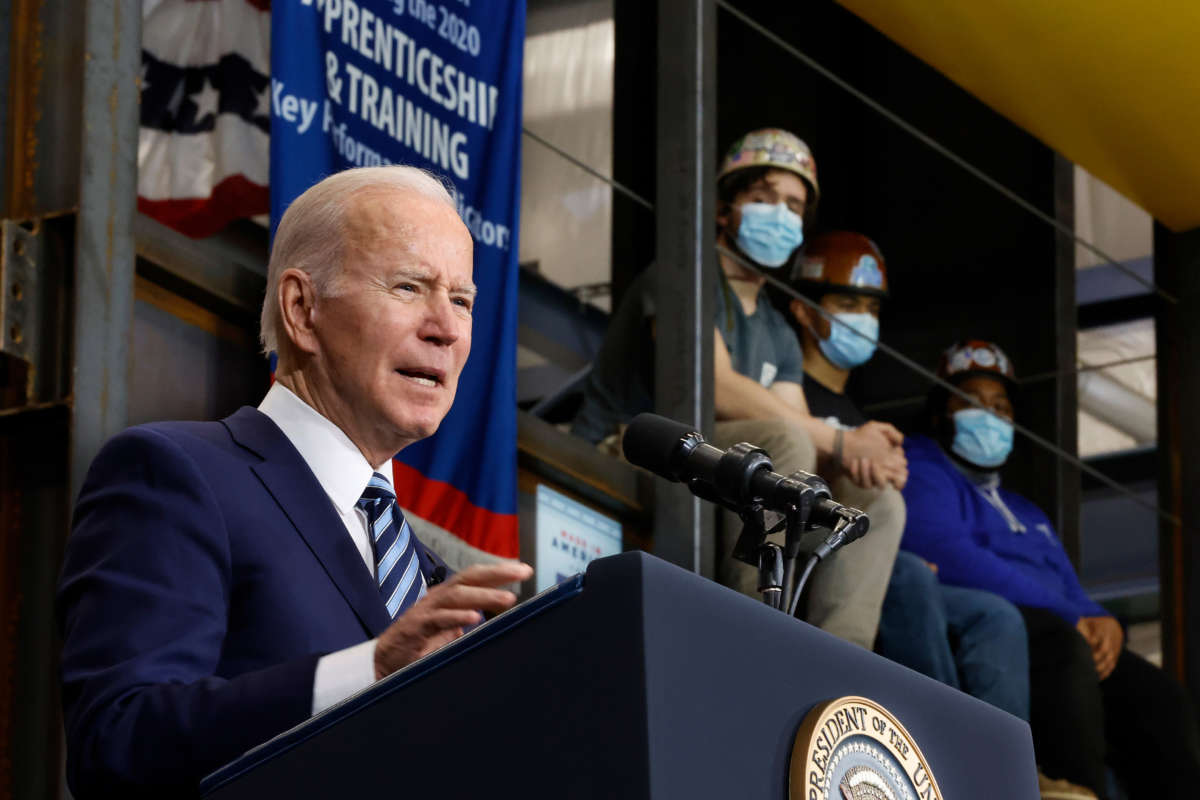On Monday, a labor task force in the Biden administration released a report outlining dozens of new guidelines aimed at making it easier for workers to unionize.
In its report, the Task Force on Worker Organizing and Empowerment – led by Vice President Kamala Harris and vice chair Labor Secretary Marty Walsh – presented around 70 recommendations to promote organizing and collective bargaining. The goal of the recommendations, the task force wrote, is to promote more good faith negotiating, to empower the workforce and to promote the use of federal funds to support organizing workers and “pro-worker employers.”
The White House has said that it plans to implement all of the task force’s suggestions. The task force will submit a second report with updates and additional proposals in six months, the White House added.
In its report, the task force recommends instructing government agencies to take steps to decrease “persuader” activity, or when a company hires anti-union consultants to quash union drives. The task force also suggests that the Department of Labor wage a pro-union communication campaign in order to increase workers’ awareness of their ability to collectively bargain and organize.
The report also recommends reforming federal funding programs, and specifically calls for barring companies from using federal contract money to union bust and hire anti-union campaigners.
Union membership has been steadily declining since the 1960s and is currently at a record low. Last month, the Bureau of Labor Statistics reported that union membership was at a dismal 10.3 percent in 2021, the same rate as in 2019 but down from 10.8 percent in 2020.
“Union density isn’t low because Americans don’t like unions,” the report’s authors wrote. “Today, 68% of Americans approve of labor unions – the highest level on record since 1965, and support for unions among young workers is even higher.”
“Polls show that more and more workers – a full 52 percent of non-union workers – want to join unions,” the report goes on. “This gap between the percentage of workers who want a union and the percentage of workers who have a union is part of the reason for this Task Force and this report.”
Joe Biden has repeatedly pledged to be the most pro-labor president in U.S. history.
“When unions win, workers across the board win. That’s a fact. Families win, community wins, America wins. We grow. And despite this, workers have been getting cut out of the deal for too long a time,” Biden said in September. “In my White House … labor will always be welcome. You know, you’ve heard me say many times: I intend to be the most pro-union President leading the most pro-union administration in American history.”
Over the past year, there has been an explosion of labor activity across the U.S. Perhaps the most notable example is the union drive spearheaded by Starbucks workers last year, which has resulted in over 50 stores filing for unionization in the past few months alone. Workers are also in the midst of several union campaigns in New York and Alabama Amazon warehouses, where a successful union drive could send shockwaves across the labor movement.
More labor reforms may be on the way. In a recent interview with More Perfect Union, National Labor Relations Board (NLRB) General Counsel Jennifer Abruzzo said that she wants to crack down on mandatory anti-union meetings and other tactics that companies use to union bust during the critical period between a petition filing and an election.
“We should not be allowing our processes to be abused in that way,” Abruzzo said. “Employers do have the right to express their opinion, but they don’t have the right to coerce, interfere with, or threaten employees with adverse action.”
She plans to ask the NLRB to consider implementing the Joy Silk doctrine, which legal researchers say could prove invaluable to the labor movement. The doctrine forces employers to recognize and bargain with a union if it has the support of a majority of workers, or else present legitimate reasons as to why the company can’t voluntarily recognize a union. This would circumvent the union election process and, crucially, the period before an election during which companies typically pull out their most aggressive union-busting tactics.
Speaking against the authoritarian crackdown
In the midst of a nationwide attack on civil liberties, Truthout urgently needs your help.
Journalism is a critical tool in the fight against Trump and his extremist agenda. The right wing knows this — that’s why they’ve taken over many legacy media publications.
But we won’t let truth be replaced by propaganda. As the Trump administration works to silence dissent, please support nonprofit independent journalism. Truthout is almost entirely funded by individual giving, so a one-time or monthly donation goes a long way. Click below to sustain our work.
